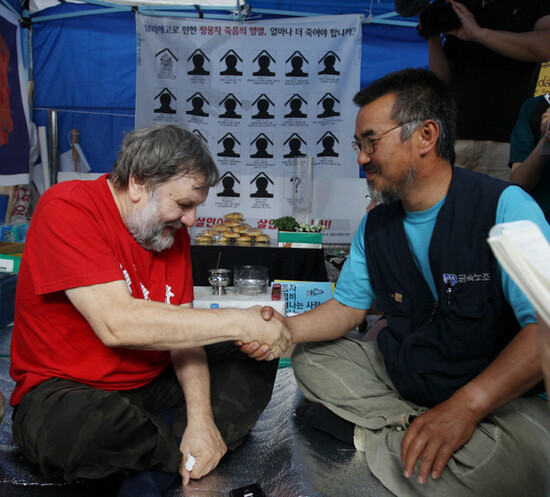hankyoreh
Links to other country sites 다른 나라 사이트 링크
Slavoj Zizek shows solidarity with dismissed Ssangyong Motors workers

By Choi Won-hyung, staff reporter
Prominent philosopher Slavoj Zizek locked hands with Ssangyong Motors laid off workers during a June 29 visit to the site of a collective memorial in front of Daehan Gate at Deoksu Palace, across from Seoul City Hall.
The site was set up to honor 22 workers and family members who have died in the wake of massive layoffs by the automaker. A solemn Zizek expressed his solidarity and sympathies to the workers there. The infamous cultural critic is wrapping up a weeklong visit to South Korea.
After arriving at 11:30 am, Zizek talked for about a half hour with Kim Jeong-woo, head of the Ssangyong chapter of the Korea Metal Workers’ Union. Afterwards, he joined Kim in lighting incense for the victims before their portraits. In the visitors’ log, he left a message saying, “You are a hope to us all. I hope you keep fighting.”
In his conversation with Kim, Zizek said the layoffs and their devastating effects on ordinary lives were a matter of concern not just for them but for everyone living under a capitalist system. “Your case shows us that the lives we are living are not at all happy,” Zizek said.
The philosopher said that it was a falsehood for businesses to claim that layoffs are economically necessary measures rather than the company’s own decision. The Ssangyong Motors struggle, he said, raises fundamental questions about the importance of democracy.
Kim asked for Zizek’s continued support, saying, “We need to alert the world to the contradictions of layoffs that are taking place through the exploitations of capital, and the reality here in South Korea as an example of neoliberalism.”
Zizek responded that a good friend was someone you are able to put to use without any reservations. “Put me to use,” he said. “I’ll gladly be used.”
The philosopher also emphasized the importance of the memorial, which he said alerts people to what they really need to be aware of. Through it, the people who pass by are able to understand the nature of the current situation in South Korean society, he said.
Zizek also said that as a symbol of suffering, the memorial would eventually have a snowball effect even if it doesn’t result in any resolution in the short term.
Kim related an episode in May when police demolished a previous memorial. “The government isn’t even showing a willingness to have dialogue or to placate us,” he explained. Zizek expressed his astonishment, calling this “very foolish.”
After the incense lighting, Zizek talked for an hour with artist Lim Min-ouk, 44, who installed a work of interactive video art beside the memorial.
When asked by Lim what he thought about voting, the philosopher said his basic view was that people were better off not voting because democracy has devolved into empty rituals. However, he also stressed the importance of making decisions on “real choices” that are worth voting for. A real choice, in these terms, might be to vote for politicians who are determined to create a social safety net for the Ssangyong laid off workers.
On Wednesday and Thursday, Zizek delivered talks at Kyung Hee Universe and Konkuk University, respectively, where he talked to local audiences about his philosophy and thinking, laying bare the ironies of the ideologies on which the capital system operates.
The memorial visit was the last stop on his itinerary in South Korea. He leaves on June 30.
Please direct questions or comments to [english@hani.co.kr]

Editorial・opinion
![[Column] Season 2 of special prosecutor probe may be coming to Korea soon [Column] Season 2 of special prosecutor probe may be coming to Korea soon](https://flexible.img.hani.co.kr/flexible/normal/500/300/imgdb/original/2024/0426/3317141030699447.jpg) [Column] Season 2 of special prosecutor probe may be coming to Korea soon
[Column] Season 2 of special prosecutor probe may be coming to Korea soon![[Column] Park Geun-hye déjà vu in Yoon Suk-yeol [Column] Park Geun-hye déjà vu in Yoon Suk-yeol](https://flexible.img.hani.co.kr/flexible/normal/500/300/imgdb/original/2024/0424/651713945113788.jpg) [Column] Park Geun-hye déjà vu in Yoon Suk-yeol
[Column] Park Geun-hye déjà vu in Yoon Suk-yeol- [Editorial] New weight of N. Korea’s nuclear threats makes dialogue all the more urgent
- [Guest essay] The real reason Korea’s new right wants to dub Rhee a founding father
- [Column] ‘Choson’: Is it time we start referring to N. Korea in its own terms?
- [Editorial] Japan’s rewriting of history with Korea has gone too far
- [Column] The president’s questionable capacity for dialogue
- [Column] Are chaebol firms just pizza pies for families to divvy up as they please?
- [Column] Has Korea, too, crossed the Rubicon on China?
- [Correspondent’s column] In Japan’s alliance with US, echoes of its past alliances with UK
Most viewed articles
- 1[Column] Season 2 of special prosecutor probe may be coming to Korea soon
- 2No good, very bad game for Korea puts it out of Olympics for first time since 1988
- 3‘We must say no’: Seoul defense chief on Korean, USFK involvement in hypothetical Taiwan crisis
- 4Division commander ordered troops to enter raging flood waters before Marine died, survivor says
- 5Is Japan about to snatch control of Line messenger from Korea’s Naver?
- 6Korea’s 1.3% growth in Q1 signals ‘textbook’ return to growth, says government
- 7Is N. Korea threatening to test nukes in response to possible new US-led sanctions body?
- 8[Editorial] Korea’s surprise Q1 growth requires objective assessment, not blind fanfare
- 9[Editorial] New weight of N. Korea’s nuclear threats makes dialogue all the more urgent
- 10[Editorial] In the year since the Sewol, our national community has drowned